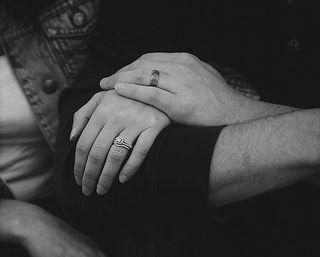
Anxiety
Do You Worry That Your Husband Won’t Be There for You?
Recent research explains why.
Posted June 8, 2018

There’s a natural human need for connection. You can see it right from birth. Infants cling to their caretakers; they need to hold and be held. That deep-seated need never goes away. We all need others to be “there for us” – especially at difficult moments. This need for attachment is the basis of Emotionally Focused Couples Therapy as developed by Dr. Sue Johnson.
Dr. Johnson discusses the difficulties couples have in overcoming the “attachment wounds” that happen when one partner needed the other, but instead felt alone, lonely, hurt, or abandoned.
Some recent research sheds some light on how these attachment wounds occur.
Published in the April 2018 Journal of Family Psychology, this study by two psychologists at Baylor University investigated the impact of stressful life events on individuals and couples.
The findings confirm one previous result and reveal two new ones. All three results fit with what we know from couples therapy.
Rivers and Sanford confirm that the way a couple works together in stressful situations makes an important difference: “when people experience stressful life events, couple behavior is associated with measures of individual well-being as well as with relationship satisfaction.” (p.381). Basically: connection and teamwork make things better; abandonment and betrayal make things worse. That makes sense. It’s not very surprising but it’s nice to have it confirmed.
However, this study has two other findings with important implications. The first finding is the title of the article, “Negative relationship behavior is more important than positive.”
This takes a little understanding. They’re not saying that negative behavior is good. They’re not saying that we should engage in negative behavior. Their point is different. Their words are, “desirable individual and relationship outcomes are more strongly associated with people refraining from negative couple behavior than with people engaging in positive couple behavior.” (p. 381). In other words: Connection and teamwork are good; abandonment and betrayal are bad. And, abandonment and betrayal are more bad than connection and teamwork are good.
Therefore, when things are stressful, the first things to do are: don’t abandon, don’t betray. And then the second things are: stay connected, work as a team.
This is important, and it fits with John Gottman’s 5 to 1 ratio of good-to-bad moments in a healthy friendship. One bad moment has a much impact as five good moments. This research seems to confirm that finding.
Rivers and Sanford’s second clarification is a little more obscure, but also very important. They write, “the effects of couple behavior may be curvilinear, such that low doses of a behavior are most important, and beyond that, increasingly extreme levels become less important.” (p. 381). In other words: Small reactions matter, especially initial reactions.
Therefore, in stressful situations, make sure you don’t start wrong. Don’t start with abandonment. Don’t withdraw into your own world. Sure, you might be shocked. Or overwhelmed. Or in denial. Sure, you might not know what to say or do. But be there for your partner.
Don’t start with betrayal. Don’t start with blaming or finding fault. Sure, you might be angry. Sure, you might be wishing things had gone differently. But don’t turn on your partner. Stay connected. Stay teammates.
The worst-case scenario could be called ‘fight and flight.’ One of you responds to the stress with fight; the other with flight. Each of you feels abandoned and betrayed. Our book, Love Cycles, Fear Cycles describes how these fight-and-flight cycles can escalate. If one of those cycles starts, you’ll want to stop it as soon as possible.
Reach out. Take their hand. Sit together. Be gentle with each other. The team has taken a hit, but keep the team connected.
To answer the question: Will they be here for me? consider past life stressors. Was there connection and teamwork, or abandonment and betrayal? It need not have been dramatic. Even small behaviors could have had a big impact. Rivers and Sanford conclude, “negative relationship behavior may be more important than positive . . . low doses of negative behavior have the potential to be highly potent.” (p. 383). Maybe this happened to you.
If it did, you two may need to talk about that attachment wound. Find a good time. Sit down together. Start soft. See if you can talk it through. If the discussion seems too hard, maybe get a couples therapist to help you.
Stressful life events happen to all of us. We all want to feel securely connected at those times. It’s one of our most basic human needs.
References
Johnson, Susan M. (2004). The practice of emotionally focused couple therapy: creating connection. New York: Brunner-Routledge.
Rivers, A. S., & Sanford, K. (2018). Negative relationship behavior is more important than positive: Correlates of outcomes during stressful life events. Journal of Family Psychology, 32(3), 375-384.
Woodsfellow, D. & Woodsfellow, D. (2018). Love cycles, fear cycles: reduce conflict & increase connection in your relationship. New York: SelectBooks.



